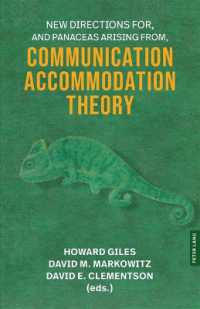- ホーム
- > 洋書
- > 英文書
- > Business / Economics
Full Description
Since economies are dynamic processes driven by creativity, social norms, and emotions as well as rational calculation, why do economists largely study them using static equilibrium models and narrow rationalistic assumptions? Economic activity is as much a function of imagination and social sentiments as of the rational optimisation of given preferences and goods. In this book, Richard Bronk argues that economists can best model and explain these creative and social aspects of markets by using new structuring assumptions and metaphors derived from the poetry and philosophy of the Romantics. By bridging the divide between literature and science, and between Romanticism and narrow forms of Rationalism, economists can access grounding assumptions, models, and research methods suitable for comprehending the creativity and social dimensions of economic activity. This is a guide to how economists and other social scientists can broaden their analytical repertoire to encompass the vital role of sentiments, language, and imagination.
Contents
Preface; Acknowledgements; 1. Preface to The Romantic Economist; Part I. The Prelude: The Romantic Economist and the History of Ideas: 2. The great divide; 3. Debates within political economy; 4. Lessons from Romanticism; Part II. Fragments of Unity: Romantic Economics in Practice: 5. Using organic metaphors in economics; 6. Economics and the nation state; 7. Incommensurable values; 8. Imagination and creativity in markets; 9. Homo romanticus and other homines; 10. Imagination and perspective in economics; 11. The Romantic economist: conclusion.




